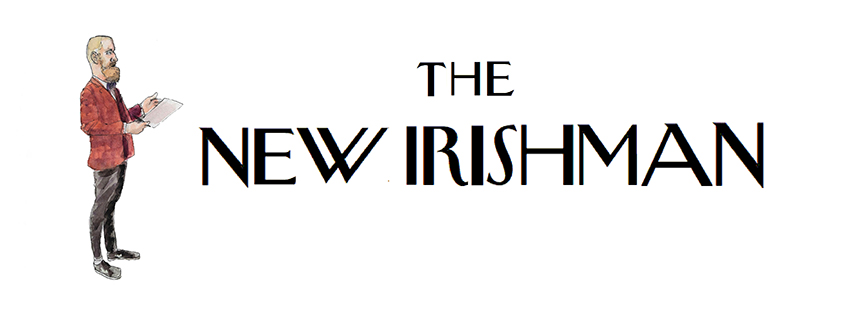David Gilmour is a 27 year old born in Belfast. He studied English and Modern History at Queen's University. Currently David works as a research analyst and runs in the world of freelance journalism. David writes mainly on Irish culture and politics for VICE and contributes to EamonnMallie.com.
Brian John Spencer: "When did you first learn about the Easter Rising of 1916?" David Gilmour:
"I first learned about the Easter Rising in a brief but serious way while at university. I was keen to spend at least some time trying to understand the men who took part and their motives in historical context."BJS: "Do the men, the act or the stated ideals in the proclamation mean anything to you?" DG:
"The event clearly changed 20th century Irish politics. I respect some of the ideas outlined in the Proclamation but not the shooting of people.
I think it’s important to be aware of how political entities can galvanise their legitimacy with dishonest and narrow readings of the past. Selectively crafted mythologies anchored in the ‘sacred’ Easter Rising have been used justify violent action rather than discourse."BJS: "When did you first learn about the Battle of the Somme?" DG:
"I first learned about the Somme in school when covering the First World War."
BJS: "Does this act, the men and their determination to show their loyalty to Britain mean anything to you?" DG:
"My reflections on the Somme are more of quiet respect for the immense bravery of the individuals who had to be there. Kaisers and Kings played chess with thousands human beings with real families and lives. Like millions of people across Europe and Ireland my great grandfather enlisted and fought in the war so there is a personal connection there.
That said, I feel that the politicisation of this suffering is deceptive, romantic and a narrow abuse of history. It upsets me a little that the Somme has been revised and recycled to entrench ideology."
BJS: "As a (British/Irish/Northern Irish*) person, is the 1916 Rising important to you and your sense of identity and sense of belonging on this island?" DG:
"I do feel that it is somewhat relevant to my identity with regards to the broader fabric of what it means to be Irish today. It helps to understand and be engaged. I don’t feel it’s challenging or immediate to my sense of belonging."BJS: "As a (British/Irish/Northern Irish*) person, is the Somme offensive important to you and your sense of identity and sense of belonging on this island?" DG:
"I think the Somme offensive, as part of the wider story of the Great War, has gone some way to inform my attitude to the pointlessness of war and violence but not so much my British identity."BJS: "Will you be commemorating or celebrating either of these two events in April and July of this year respectively?" DG:
"I don’t think so, but I’ll not be passive. I’ll definitely be taking it all in. It’ll be an interesting year."BJS: "As a person on (or from) the island are you happy with the where we are now at in terms of culture, cosmopolitanism and broad-mindedness?" DG:
"Not entirely. Identity for many people of Northern Ireland can still be very much constructed from dominant, narrow traditions of the past and are politically introverted. Our sense of identity and current conversations are still burdened and dictated by an obsession with historical events and cultural symbolism. History and tradition carry too much authority - hence the mad dash to claim commemorations to perpetuate our political narratives. This only really serves to corrode community relations. That’s not to say tradition is bad, it’s essential – just not central. For many in our province though it’s an unspoken and weighty communal obligation tying down forward-moving, free-thinking citizens.
I do believe this to just be a lingering condition, growth pains in a post-conflict society, but it is our biggest challenge (in Stormont and on the streets). The proof that when we’ve finally moved beyond the political trenches of the Troubles into the cosmopolitan space will be when we can freely explore our fragmented history, and even topple flawed revisionist myths and political narratives, without committing a kind of cultural blasphemy. The right to question the tiresome indoctrination and historical romanticism is fundamental in overturning what has cursed generations of men and women, filling them with enough ideological self-righteousness to kill and hate one another.
That said I think we are making broad progress, people just want it quicker.
The internet alone won’t save us but I do believe it’s globalising force acting on our culture and diluting old agendas. This is a good thing for us all. International conversations that confront economic inequality, human rights and the environment are being given air-time."BJS: "What are your hopes for the future of this divided province and island?" DG:
"I hope for NI is that we can begin to construct and articulate ourselves through economic, social and cultural aspiration and optimism – rather than historical retrospection. We also need to do this in a way that does not leave anyone out. Less frustration and judgement toward those that are still afraid or angry and more collaboration and imagination.
In the Republic I’d like to see accountability and regulation for big business and banks. Last year’s same-sex marriage referendum was a massive cultural moment there, conservativism and tradition grounded in religious ideology clearly making way for secular democracy. That’s a fascinating shift empowered in large part by old and young generations who returned to the ballot and exerted absolute faith in a political process, making history not re-enacting it. That should be our hope for the future everywhere."


No comments:
Post a Comment